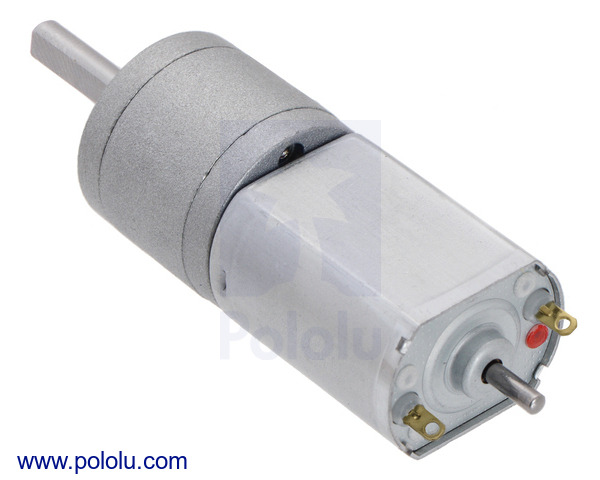Pololu Metal DC Gearmotors » 20D Metal Gearmotors » 6V Carbon Brush (CB) 20D Gearmotors »
313:1 Metal Gearmotor 20Dx46L mm 6V CB with Extended Motor Shaft
These small brushed DC gearmotors can deliver a lot of power for their size. This version has a 6V brushed DC motor with long-life carbon brushes combined with a 312.5:1 metal spur gearbox. The gearmotor is cylindrical with a diameter of 20 mm, and the D-shaped output shaft is 4 mm in diameter and extends 18 mm from the face plate of the gearbox. This version also has a 6 × 2 mm extended motor shaft.
Key specifications:
| voltage | no-load performance | stall extrapolation |
|---|---|---|
| 6 V | 45 RPM, 150 mA | 13 kg⋅cm (180 oz⋅in), 2.9 A |
Note: the gearbox torque limit is 70 oz-in (5 kg-cm); see detailed description for important product limitations.
Alternatives available with variations in these parameter(s): gear ratio motor type extended motor shaft? Select variant…
 Compare all products in 6V Carbon Brush (CB) 20D Gearmotors.
Compare all products in 6V Carbon Brush (CB) 20D Gearmotors.
| Description | Specs (17) | Pictures (14) | Resources (3) | FAQs (3) | On the blog (0) | Distributors (12) |
|---|
Dimensions
| Size: | 20D × 47.7L mm1 |
|---|---|
| Weight: | 47 g |
| Shaft diameter: | 4 mm2 |
General specifications
| Gear ratio: | 312.5:1 |
|---|---|
| No-load speed @ 6V: | 45 rpm |
| No-load current @ 6V: | 0.15 A |
| Stall current @ 6V: | 2.9 A3 |
| Stall torque @ 6V: | 13 kg·cm3 |
| Max output power @ 6V: | 1.6 W |
| Extended motor shaft?: | Y |
| Long-life carbon brushes?: | Y |
| Motor type: | 2.9A stall @ 6V CB (carbon brush) |
Performance at maximum efficiency
| Max efficiency @ 6V: | 25 % |
|---|---|
| Speed at max efficiency: | 38 rpm |
| Torque at max efficiency: | 2.4 kg·cm |
| Current at max efficiency: | 0.61 A |
| Output power at max efficiency: | 0.93 W |
Notes:
- 1
- Not including output shafts; output shafts add 24 mm to the total length.
- 2
- D shaft.
- 3
- Stalling is likely to damage the gearmotor. Stall parameters come from a theoretical extrapolation of performance at loads far from stall. As the motor heats up, as happens as it approaches an actual stall, the stall torque and current decrease.




































